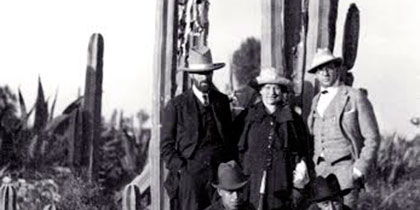
October 1, 2014, by bramh2
Lawrence and Mexico
By Annalise Grice, School of English
Many people are surprised to learn that D. H. Lawrence travelled all over the world during the course of his short life. New Mexico was particularly significant to Lawrence: in a 1928 essay he commemorated his time there as ‘the greatest experience from the outside world that I have ever had’. Lawrence and his wife Frieda first visited Taos, New Mexico in September 1922; they were to stay in New Mexico and Mexico at intervals until September 1925.
Lawrence was fascinated by Mexican culture, which stimulated his writing. The Lawrences visited sites of cultural significance, including an Apache reservation and Taos Pueblo; they particularly enjoyed watching and reconstructing Indian dances. While living beside Lake Chapala in 1923 Lawrence began ‘Quetzalcoatl’, the novel of the American continent that was to become The Plumed Serpent. Lawrence and Frieda moved to New Mexico in March 1924 to live on a small, neglected ranch given to Frieda (in exchange for the manuscript of Sons and Lovers) by a wealthy American patron of the arts, Mabel Dodge Luhan. The Lawrences were accompanied by the artist Dorothy Brett, who – to Frieda’s exasperation – was assiduously devoted to Lawrence. After carrying out some practical home improvements to the ranch Lawrence swiftly wrote several great works, including the novella St Mawr and short stories ‘The Woman Who Rode Away’ and ‘The Princess’.
In August 1924 Lawrence suffered his first bronchial haemorrhage (an ominous indication of the tuberculosis which would end his life in March 1930). His illness spurred the trio to move to Oaxaca, Mexico in November. There, Lawrence wrote a series of travel sketches entitled Mornings in Mexico; his own illustration of indigenous dancers featured on its dust jacket.
As part of the Festival for the Humanities, Professor Neil Roberts will talk about why Lawrence went to Mexico, how he responded to Mexican culture, and how it influenced his writing. The lecture will take place on Wednesday 19 November from 6.30-8pm, at the D. H. Lawrence Heritage Centre in Eastwood.
Neil Roberts is Emeritus Professor of English Literature at the University of Sheffield and Honorary Professor of D.H. Lawrence Studies at Nottingham. He has written and edited numerous books on nineteenth and twentieth century literature, including D.H. Lawrence, Travel and Cultural Difference (2004) and a study guide to Women in Love (2007). He is currently working on the background to the writing of Sons and Lovers.
@BeingHumanFest, #BeingHuman14
No comments yet, fill out a comment to be the first

Leave a Reply